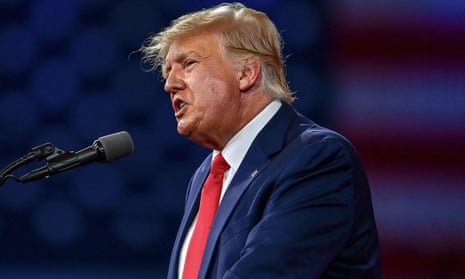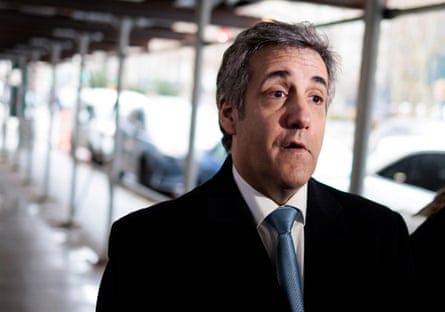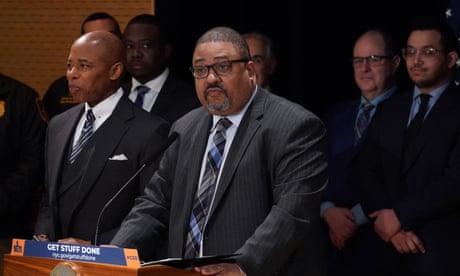
Trump in panic mode as he braces for likely charges in Stormy Daniels case
Manhattan district attorney expected to file criminal charges against ex-president for payment to adult film star in 2016
Sun 19 Mar 2023 15.30 EDT
First published on Sun 19 Mar 2023 15.15 EDTDonald Trump is bracing for his most legally perilous week since he left the White House, with the Manhattan district attorney likely to bring criminal charges against him over his role in paying hush money to adult film star Stormy Daniels, as he huddled this weekend to strategize his legal and political responses.
The former US president has posted in all-caps on his Truth Social platform that he expected to be “ARRESTED ON TUESDAY OF NEXT WEEK” and called for his supporters to engage in protests – an ominous echo of his tweets urging protests in the lead-up to the January 6 US Capitol attack.
Trump’s post was nothing more than guesswork about when Alvin Bragg might bring charges, sources close to Trump said, after he saw media reporting that the district attorney’s office had contacted the US secret service about security in the event of an indictment.
The grand jury in New York hearing evidence in the resurrected 2016 hush money case is now expected to hear from one more witness on Monday, making it unlikely that an arrest would come the following day because it could take additional hours to draft charging papers.
That witness is reportedly Robert J Costello who is appearing at the request of Trump’s legal team. Costello was once a legal adviser to former Trump lawyer Michael Cohen but the two have since fallen out. Costello’s testimony is likely to be aimed at undermining Cohen’s.
But the frenzied posts from Trump reflected his deep panic and anxiety over the imminence and likelihood of criminal charges, the sources said, not least because he is powerless to stop the district attorney’s office from moving forward with a case that will take the US into new legal territory as Trump revs up his 2024 campaign for the Republican presidential nomination.
Trump and his allies have suggested in recent days that an indictment in the hush money case could benefit him politically – the Republican base might see the years-old case as a genuine “witch-hunt” as he has claimed – but it is also true that Trump himself is deeply fearful of criminal charges.
Trump discussed the hush money case every day last week, and his advisers say they have run through various scenarios in the event of an indictment, including whether he would initially travel to New York for an arraignment, or appear remotely from his Mar-a-Lago resort.
Trump has expressed interest in appearing in person at the Manhattan criminal court, where he believes he can turn proceedings into a spectacle before a gaggle of reporters, sources said, and raised the prospect on Saturday afternoon as he travelled to Oklahoma for an NCAA wrestling championship.

But some members of his legal team have advised against making such an appearance in person, citing security issues among other concerns, and have suggested he allow them to negotiate an agreed-upon surrender date and a remote initial appearance when they are notified of charges.
Trump’s legal team has separately focused on a defense strategy. The outside counsel – Joe Tacopina and Susan Necheles – have reasoned that a hush money case centered on campaign finance violations could be weak after a similar prosecution against Democratic senator John Edwards failed in 2012.
If the indictment alleges the hush money violated campaign finance laws, the Trump lawyers are expected to argue that it fails the “irrespective test” – that Trump would have paid Daniels irrespective of the 2016 campaign to avoid the embarrassment because he was already a public figure.
Trump may face an uphill struggle with those arguments, given the fact that having “mixed motives” to protect himself personally and to protect his campaign could leave him liable, and the timing of the payments suggests there was an urgency to pay the money before the end of the 2016 campaign.
In response, the Trump legal team is expected to argue that because Daniels tried to sell her story about an affair with Trump in 2011, and she was told then to “leave Trump alone. Forget the story”, that proves her silence was desired long before Trump was running for president.
Trump’s lawyers recently made these arguments to the district attorney’s office when Necheles went in to urge Bragg to drop the case, the Guardian previously reported. But all signs indicate that Bragg will move ahead with the case all the same in an unprecedented indictment of a former US president – and one seeking to return to the Oval Office.
The investigation concerns $130,000 that Trump made to Daniels through his then lawyer Cohen in the final days of the 2016 campaign. Trump later reimbursed Cohen with $35,000 checks using his personal funds, and Cohen pleaded guilty in 2018 to federal charges involving the hush money.
The district attorney’s case is likely to focus on how Trump and the Trump Organization handled the reimbursements. According to court filings in the federal case, the Trump Organization falsely recorded the payments as legal expenses, referencing a legal retainer with Cohen that did not exist.
The district attorney’s office has had at least seven top Trump aides and advisers testify before the grand jury in recent weeks, including Cohen, who testified for around two hours on Wednesday – his second appearance – and every juror was said to have asked a question, suggesting an engaged grand jury.
That is a typical sign for prosecutors as they weigh potential charges, legal experts say, because it could indicate the grand jury found him to be a compelling witness – and a jury at an eventual trial might be similarly convinced.

No comments:
Post a Comment